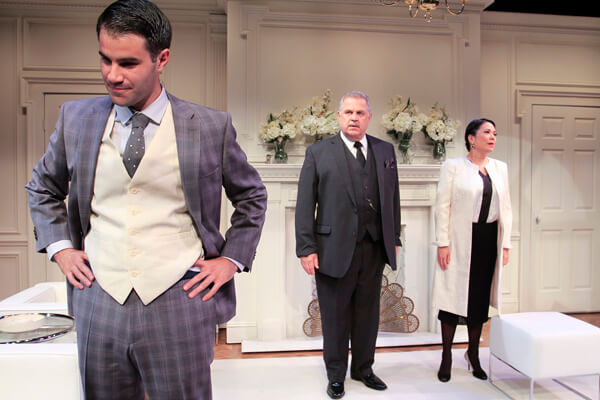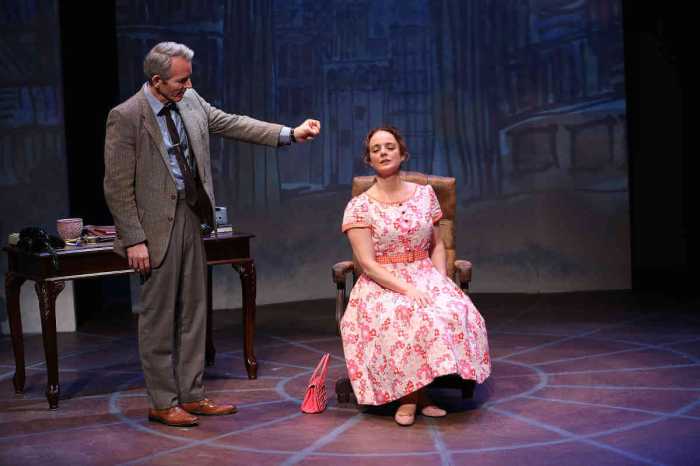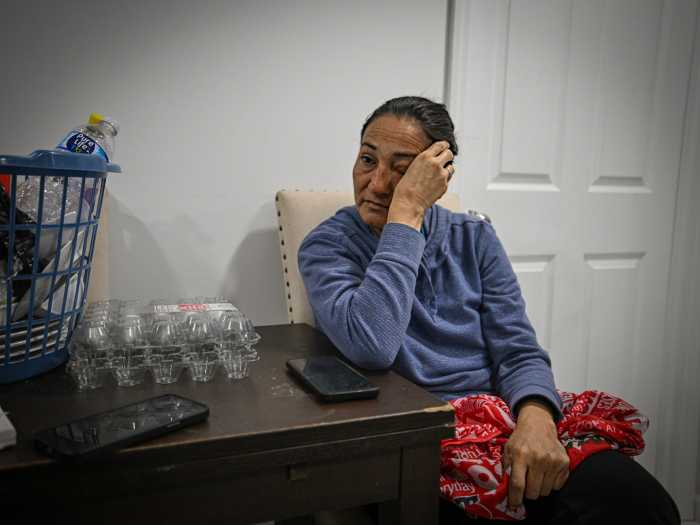Bernardo Cubría, Cliff Bemis, and Christine Toy Johnson in PHILIP GOES FORTH by George Kelly. | RAHAV SEGEV/ PHOTOPASS.COM
In its quest to rediscover supremely talented yet sadly neglected American playwrights, the Mint Theater Company could scarcely have found one more deserving — or fascinating — than George Kelly (1887-1974).
Lauded as a realistic moralist who avoided sentimentality, Kelly turned out nearly a dozen plays, mostly in the 1920s and 1930s, that invited comparisons to Molière and Chekov. In character-driven plays capturing the rocky rhythms of domestic life with sharp satire, Kelly recalls other American dramatists like Clifford Odets and Eugene O’Neill. In his heyday, he was a fixture on Broadway and even won the Pulitzer Prize for his 1925 psychological drama “Craig’s Wife.” He insisted on directing his own plays, believing no one else could fully realize his visions.
While Kelly was a lifelong “confirmed bachelor,” he had a secret relationship with his “valet,” William Weagley, for 55 years (reportedly, Weagley was pointedly not invited to Kelly’s funeral but slipped in anyway). Kelly encouraged his promising young niece to take up acting after she appeared in one of his plays in 1949. That would be Grace Kelly.
A starry-eyed young man follows his dreams to the big city and gets lost
This season, the Mint has chosen to revive the underappreciated “Philip Goes Forth,” Kelly’s comedic drama about a young man who rejects his father’s business to try his luck at writing plays in New York. The play received mixed notices when it opened on Broadway in 1931 and ran for only 97 performances.
While the Mint is known for unearthing theatrical gems and polishing them to a healthy sheen, here the flaws are still evident. This “Philip Goes Forth” is an imperfect play in an imperfect production.
The plot focuses on 23-year-old Philip (Bernardo Cubría), furious that his father (Cliff Bemis) demands he stick around rather than follow his playwriting dreams.
“Don’t imagine, whenever you get tired floating around up there in the clouds, that you can drop right back into your place down here,” snarls his father.
Philip’s Aunt Marion (Christine Toy Johnson), who has assumed the maternal role since his mother died, smiles, grits her teeth, and supports his decision.
Philip flees to New York, where he joins a college chum at a Lexington Avenue boardinghouse for aspiring artists run by Mrs. Ferris (Kathryn Kates), a great stage actress whose glory days are well behind her. She warns Philip he’s on the wrong track, “trying to vindicate a silly vanity.” The wannabe dramatist runs into more than a few roadblocks, and a tragedy at the house causes him much soul-searching.
Unfortunately, the play’s bold, genre-busting conceit may also be its undoing. It’s an odd mix of drawing room comedy and tragic object lesson, which under the confused direction of Jerry Ruiz fails to strike an easy balance.
The 10-person ensemble is as uneven as the tone. As played by Cubría, the intrepid Philip comes across as spoiled and unappealing, hardly a protagonist worth rooting for. The mild, miscast Johnson barely registers as the well-meaning mediator between father and son. Bemis seems tentative and ill at ease in the role of the industrious, demanding father who built his business from the ground up.
Faring much better is the gifted Kates, who infuses the mother-hen landlady role with a heartwarming gentility. As Philip’s devoted love interest, Cynthia, Natalie Kuhn exudes grace and charm in equal measure. Perhaps the strongest turn is delivered by Carole Healey as the free-spirited, loquacious family friend Mrs. Oliver, adding a brash dose of comic relief to the proceedings.
Set designer Steven Kemp has created an impeccably stylish, creamy white, upper middle class sitting room for the first act, contrasted nicely by the bohemian common room of the boardinghouse — cluttered with books, cubist paintings, colorful fabrics, and artsy bric-a-brac — in the second and third acts.
Despite the drawbacks, “Philip Goes Forth” is highly entertaining and its central themes remain intact –– duty to family versus self, the value of stepping out of a comfort zone and “going forth,” the folly of pursuing an impossible dream, and knowing when to cut your losses and move on.
PHILIP GOES FORTH | Mint Theater, 311 West 43rd St, third fl. | Through Oct. 27; Tue.-Thu. at 7 p.m.; Fri.-Sat. at 8 p.m.; Sat., Sun. at 2 p.m. | $55 at minttheater.org or 866-811-4111





































